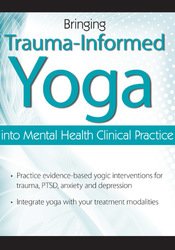

Watch this state-of-the-art workshop and discover yoga-based interventions to regulate the autonomic nervous system and learn exactly how to incorporate these interventions into your psychotherapy session.
Watch Debra Premashakti Alvis, Ph.D., RYT, in an in-depth training on the principles and practices of trauma-informed yoga, with a special focus on chair yoga postures, yogic breathing exercises, and yoga nidra, the yogic sleep. She is one of the first practitioners to combine yoga with the wisdom of neuroscience and techniques from somatic psychology into a personalized approach for bringing yoga into the session, groups, and yoga classes. The focus of this work is on regulating the client’s autonomic nervous system as the groundwork for trauma healing.
Debra trained with Dr. Bessel van der Kolk’s The Trauma Center in Boston and will share transformational skills for you and your clients. Learn first-hand why organizations as diverse as the U.S. Army and the U.S prison system have embraced yoga as an evidence based approach to treat post-traumatic stress disorder, anxiety and depression.
Through lecture, experiential exercises, video clips, and case studies, you will leave with the background and tools you need to add trauma-informed yogic interventions to whatever style of therapy you currently practice
Discover how trauma-informed yoga can improve your clinical outcomes!
This online program is worth 6.25 hours CPD.
| File type | File name | Number of pages | |
|---|---|---|---|
| Manual (4.78 MB) | 55 Pages | Available after Purchase | |
| Manual - French (4.78 MB) | 55 Pages | Available after Purchase | |
| Manual Part 2: Neuroscience, Trauma and Yoga - French (4.78 MB) | 55 Pages | Available after Purchase | |
| Manual - Italian (4.78 MB) | 55 Pages | Available after Purchase | |
| Manual Part 2: Neuroscience, Trauma and Yoga - Italian (4.78 MB) | 55 Pages | Available after Purchase |

Debra Premashakti Alvis, PhD, a licensed psychologist, developed the Mind/Body Program at the University of Georgia, providing clinician training on the integration of mindfulness and contemplative practices into psychotherapy. Her work as a professor at the University of Georgia included the supervision of doctoral students and co-leading a research team investigating mindfulness.
In addition to teaching, Dr. Alvis maintains a private practice and has more than 25 years of clinical experience in treating clients with a variety of conditions by mindfulness principles, body-oriented principles and traditional psychotherapeutic approaches. She also has an over 30-year personal contemplative practice.
Speaker Disclosures:
| 5 |
|
| 4 |
|
| 3 |
|
| 2 |
|
| 1 |
|
Satisfaction Guarantee
Your satisfaction is our goal and our guarantee. Concerns should be addressed to info@pesi.co.uk or call 01235847393.
Please wait ...